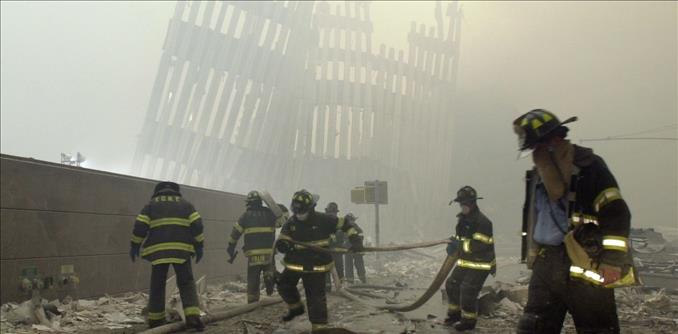
9/11 anniversary: Understanding extremist motives could stop further violence
What's changed since 9/11? How has our view of Islamist terrorists been transformed since that dreadful day? Have more recent attacks by ISIS changed the face of terrorism once again?
As we remember the tragedy that struck America 16 years ago, have we been truly cognizant of the grievances that might have led al-Qaida to commit such a horrific attack?
On Sept. 11, 2001, the American people encountered up close the fury of .
But the U.S. government had long been familiar with groups like al-Qaida and the Taliban. The Reagan administration had backed against Soviets in Afghanistan by funding Pakistan's ISI as well as the Afghan mujahedeen in their fight against the Communist regime.
The U.S. therefore indirectly facilitated the emergence of the Taliban, because .
Al-Qaida and the Taliban had, for the most part, been in the business of fighting their 'close enemy,' the apostate rulers who governed in Muslim lands. At that point, radical Islamist groups were not much of a threat to the Americans. They were more concerned with maintaining the balance of power through its allies and ensuring its economic and strategic presence in the Middle East.
U.S. embassies bombedBut then al-Qaida decided to target the 'far enemy' and , murdering 224 people and injuring more than 5,000. As well, they . What prompted Osama bin Laden to turn his attention to the 'far enemy' was since 1990.
For the now-deceased bin Laden, it was scandalous that Saudis tolerated the presence of a non-Muslim foreign military in the land which was home to the sacred sites of Mecca and Medina. At first, . Violence would have brought criticism from Saudis who might have shared some of al-Qaida's concerns but did not want their country to be under siege. Instead, he concentrated his attacks on U.S. targets.
The Clinton administration and the CIA were now worried that the head of the terrorist organization could perpetrate an attack on U.S. soil. They tried but failed to convince the Taliban to hand over the al-Qaida leader and they failed to eliminate him.
Then came 9/11.
Three years after the event, bin Laden that incited him to plan an attack on the twin towers:
For some extremist Islamists, bin Laden's retaliation is justified and rooted in the Islamic principle of qiṣāṣ (retaliation in kind), a somewhat similar idea to 'an eye for an eye' as expressed in the . However, according to some scholars, this is a misunderstanding of qiṣāṣ: Retaliatory action in Islamic law is and prescribed to individual cases.
Grievances like bin Laden's against the U.S. , who also use qiṣāṣ as a means to legitimize their own actions in response to attacks by the international coalition on Muslims in Syria and Iraq.
Islamaphobia persistsFollowing 9/11, North Americans expressed an and all things Muslim. Many non-Muslims were suspicious of Muslims and still feel threatened by Islam. Those fears have dramatically increased since the advent of ISIS, where have now reached global proportions.
There are also now renewed concerns about al-Qaida with , son of the organization's founder.
This has unfortunately led people to establish false equivalencies between the beliefs of violent Islamist organizations and the majority of peaceful Muslims around the world. This profound misunderstanding is now evident in fuelled by anti-Muslim sentiments and full-on Islamaphobia in many parts of the world.
It's worth noting that terror attacks are also perpetrated by those as well.
Understanding what ignites the rageAs we reflect on the tragedy of 9/11 we should carefully consider and ponder the issues and causes that propelled al-Qaida forward in order to best guard ourselves from further violence.
Many of the grievances stem from the premise that the , as understood through in their own lands, and the discrimination they face in many non-Muslim countries.
Attempting to understand what is fuelling violent Islamist extremists does not mean anyone condones terror attacks. Instead, understanding their perspectives may help us counter their ideologies. When western governments regard all Muslims as suspicious and an entire religion as malevolent, they are falling in line with Islamic State propaganda.
Standing idle in the face of discrimination and anti-Muslim bigotry will only widen the chasm that already exists between people, engendering greater fear and suspicion, and leading to further isolation from each other — and, sadly, the risk of further violence, misery and despair.

Legal Disclaimer:
MENAFN provides the
information “as is” without warranty of any kind. We do not accept
any responsibility or liability for the accuracy, content, images,
videos, licenses, completeness, legality, or reliability of the information
contained in this article. If you have any complaints or copyright
issues related to this article, kindly contact the provider above.


















Comments
No comment